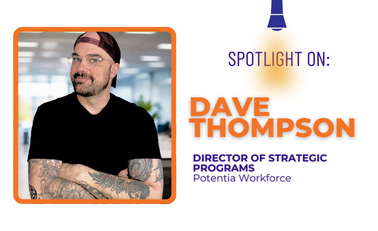
How did you get into cyber?
If you’d told me that I’d have anything to do with cyber years ago, I wouldn’t have believed you. I’m not a techy person. My focus is Neurodiversity Employment. I have ADHD, Dyslexia, and Sensory Processing issues. All I could picture doing was changing a world of work that didn’t work for me and so many others. That’s brought me to Potentia Workforce and partnering with forward-thinking companies in thinking differently about their workforce.
What exactly does Potentia Workforce do?
We provide training, talent sourcing, coaching and process consulting for organizations to better hire, support, retain and leverage Neurodiversity (ND) talent. We have two programs – STARS, which focuses on proactive hiring initiatives, and EMPOWER, which focuses on your already neurodiverse workforce.
There’s already so much natural cognitive variation within the workforce who need to be better understood, but still many different thinkers who have been sidelined. We seek to change both of those things.
How does cyber fit into this?
Several ways! We work in various industries and across many roles, from technical, to creative, to leadership. We know that no two people think or work alike. That said, there are many ND professionals that thrive in the cyber field. When you combine that with the increased need for cyber talent, it’s an absolute win-win.
What advice do you have for other ND professionals looking to enter the job market, or already working?
I remind ND job seekers that we’re not the problem. The world of work has plenty of catching up to do. The good news is that that’s happening fast and there are many programs and resources to lean on, including Potentia’s own ND Talent Community.
For current employees, my first message would be that disclosure depends on psychological safety, which many of us lack, so we don’t pressure anyone to do that. There are ways to get the conversation started at your company – ERG’s and outside partners can make a huge difference. When it comes to the ND conversation, it should never be about us without us.
What can companies do?
Understand that your workforce is already neurodiverse and that that’s a good thing. Whether you’re creating environments where employees and employers both benefit from the differences in our brains starts with you. Listen to your people, get plugged into the growing external conversation about Neurodiversity at work, make a deliberate plan and get started.